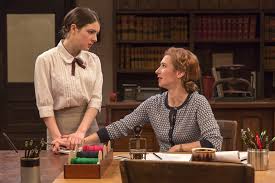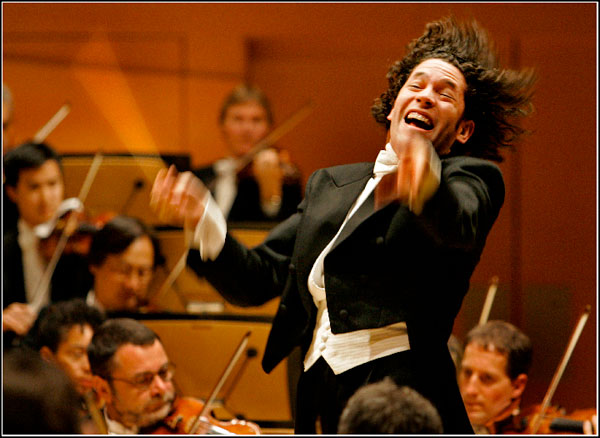In today’s Wall Street Journal drama column I review two rare and interesting off-Broadway revivals, Keen Company’s Middle of the Night and the Mint Theater’s London Wall. Here’s an excerpt.
* * *
Paddy Chayefsky doesn’t exactly need to be “revived,” seeing as how “Network” is even more admired now than when it first came out in 1976. But nowadays most people know him only for that ferociously prophetic satire of broadcast news and for “Marty,” the 1953 live-TV drama whose film version snagged a best-picture Oscar and turned him into a Hollywood screenwriter. Few recall that Chayefsky also wrote two stage plays, “Middle of the Night” (1956) and “The Tenth Man” (1959), that both had long runs on Broadway but haven’t been seen in New York for years.
Now Keen Company, the Off-Broadway troupe that specializes to consistently fine effect in what its mission statement refers to as “sincere plays,” has exhumed “Middle of the Night,” the story of a 53-year-old New York widower (Jonathan Hadary) who falls hard for his 23-year-old secretary (Nicole Lowrance). Adapted for the stage by Chayefsky from one of his hour-long “Philco Television Playhouse” scripts, it’s a kitchen-sink midlife-crisis drama with a strongly ethnic flavor–Jerry is a down-to-earth Jewish garment manufacturer, Betty a needy, emotionally immature Gentile…
Mr. Hadary and Ms. Lowrance make an affecting couple, and Jonathan Silverstein’s pointed staging succeeds in papering over most of the flaws. The result is a cultural period piece that still has the power to touch the heart…
 John Van Druten, who used to be big (he wrote five Broadway hits in the ’40s and ’50s) and is now forgotten, has lately come to the attention of the Mint Theater Company, another first-class Off-Broadway troupe that specializes in “worthy but neglected plays.” The Mint has just mounted the U.S. premiere of his “London Wall,” a 1931 comedy set in a London law office. Unlike “Middle of the Night,” this witty, impeccably crafted tale of a quartet of working women and the benighted men for whom they work has a distinctly contemporary flavor, enough so that you’ll come away wondering whether Van Druten might deserve credit for inventing the workplace comedy long before it found favor on TV.
John Van Druten, who used to be big (he wrote five Broadway hits in the ’40s and ’50s) and is now forgotten, has lately come to the attention of the Mint Theater Company, another first-class Off-Broadway troupe that specializes in “worthy but neglected plays.” The Mint has just mounted the U.S. premiere of his “London Wall,” a 1931 comedy set in a London law office. Unlike “Middle of the Night,” this witty, impeccably crafted tale of a quartet of working women and the benighted men for whom they work has a distinctly contemporary flavor, enough so that you’ll come away wondering whether Van Druten might deserve credit for inventing the workplace comedy long before it found favor on TV.
Part of what makes “London Wall” so involving is that Van Druten heightens the play’s emotional stakes by homing in on the plight of Blanche Janus (perfectly played by Julia Coffey), the firm’s sardonic, wised-up senior secretary, who is 35, a notch or two older than her colleagues, and all too aware of what awaits her should she fail to find a husband: “Well, what else am I to do? Stick here, and go on living at home looking after father? I’m the only one left. And then he’ll die, and then what else is there? Rooms, or a boarding house, or a club for women who can’t get married? Earning three pounds a week for the rest of my life. No!” Yes, “London Wall” is a romcom with a (mostly) happy ending, but the fact that Blanche is up against it–and knows it–keeps you from getting too cozy…
* * *
Read the whole thing here.
Archives for February 28, 2014
Must Dudamel speak out?
In today’s Wall Street Journal “Sightings” column I offer my thoughts on the continued silence of Gustavo Dudamel and Valery Gergiev regarding human-rights abuses in their native lands. Here’s an excerpt.
* * *
 Gustavo Dudamel, the 33-year-old Venezuelan conductor who is music director of the Los Angeles Philharmonic, is also a loyal alumnus of El Sistema, Venezuela’s much-admired public music-education program. He continues to support El Sistema and to lead concerts by government-funded youth orchestras–and declines to criticize the repressive policies of Nicolás Maduro, the country’s autocratic president, which have led to public protests that are being suppressed violently.
Gustavo Dudamel, the 33-year-old Venezuelan conductor who is music director of the Los Angeles Philharmonic, is also a loyal alumnus of El Sistema, Venezuela’s much-admired public music-education program. He continues to support El Sistema and to lead concerts by government-funded youth orchestras–and declines to criticize the repressive policies of Nicolás Maduro, the country’s autocratic president, which have led to public protests that are being suppressed violently.
“I’m a musician,” Mr. Dudamel has explained. “If I were a politician, I would act as a politician for my own interest. But I’m an artist, and an artist should act for everybody….I cannot allow El Sistema to become a casualty of politics. Regardless of political or public pressure, I will continue this work in Venezuela and throughout the world.”
If his response has a familiar ring, it’s because you’ve heard similar words from another internationally famous conductor, Russia’s Valery Gergiev. Mr. Gergiev, who is a longtime supporter of the thuggish Vladimir Putin regime, is being harshly criticized by colleagues for not speaking out against Mr. Putin’s anti-gay policies. His response? “It is wrong to suggest that I have ever supported anti-gay legislation and in all my work I have upheld equal rights for all people. I am an artist and have for over three decades worked with tens of thousands of people and many of them are indeed my friends.”
Are either of those slippery statements good enough? And do artists have a responsibility to protest against moral injustice?
Let’s start with what ought to be a given: No artist is obliged to create political art, however worthy the cause. To do so is to run the risk of undermining the seriousness of his art by enlisting it in the service of propaganda. On the other hand, every artist is subject to the same moral obligations as his fellow men. Even a genius has no right to shrug off the universal claims of common decency–and it’s no secret that great artists as a group have an unfortunate way of doing whatever they think will best serve their own purposes….
* * *
Read the whole thing here.
Almanac: Moss Hart on theatrical economy
“The pencil in his hand began to make quick, darting marks on the manuscript, bracketing the cuts on page after page. It was astonishing to find how much of what we had written was unnecessary, how we had underestimated an audience’s ability to grasp what was needful for them to know without restating it not once but sometimes two or even three times. It was reassuring to find that so meticulous a craftsman as George Kaufman himself still had to learn the hard way the ever-constant lesson of economy.”
Moss Hart, Act One
